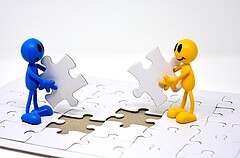Puzzeln – der neue Schutzfaktor für das kognitive Altern. [06.11.18]
In Zeiten des demografischen Wandels stellt die Prävention von neurokognitiven Störungen eine der großen medizinischen Herausforderung dar. In einer Studie unter Mitwirkung von Hohenheimer Wissenschaftlern wurden die kognitionsfördernden Eigenschaften des Puzzlespiels untersucht.Original Study
Fissler, Patrick; Küster, Olivia Caroline; Laptinskaya, Daria; Loy, Laura Sophia; Von Arnim, Christine A.F.; Kolassa, Iris Tatjana (2018): Jigsaw puzzling taps multiple cognitive abilities and is a potential protective factor for cognitive aging. In: Frontiers in Aging Neuroscience 10 (OCT). DOI: 10.3389/fnagi.2018.00299.
Author information:
- aInstitute of Psychology and Education, Clinical and Biological Psychology, Ulm University, Ulm, Germany
- bDepartment of Neurology, Ulm University, Ulm, Germany
- cClinic for Neurogeriatrics and Neurological Rehabilitation, University and Rehabilitation Hospital Ulm, Ulm, Germany
- dDepartment of Media Psychology, University of Hohenheim, Stuttgart, Germany
Abstract
Prevention of neurocognitive disorders is currently one of the greatest unmet medical challenges. The cognitive effects of solving jigsaw puzzles (JPs) have not been studied so far, despite its frequent use as a leisure activity in all age cohorts worldwide. This study aimed at closing this gap between a lack of science and a frequent real-world use by investigating the cognitive abilities recruited by JP as well as the cognitive benefits of lifetime and 30-day JP experience. A total of 100 cognitively healthy adults (≥50 years of age) were randomized to either a 30-day home-based JP intervention (≥1 h/day) plus four sessions of cognitive health counseling (JP group) or four sessions of cognitive health counseling only (counseling group). We measured global visuospatial cognition by averaging the scores of eight z-standardized visuospatial cognitive abilities (perception, constructional praxis, mental rotation, speed, flexibility, working memory, reasoning, and episodic memory). JP skill was assessed with an untrained 40 piece JP and lifetime JP experience with retrospective self-report. JP skill was associated with all assessed cognitive abilities (rs ≥ 0.45, ps < 0.001), and global visuospatial cognition (r = 0.80 [95% CI: 0.72-0.86], p < 0.001). Lifetime JP experience was associated with global visuospatial cognition, even after accounting for other risk and protective factors (β = 0.34 [95% CI: 0.18-0.50], p < 0.001). The JP group connected on average 3589 pieces in 49 h. Compared to the counseling group, they improved in JP skill (Cohen's d = 0.38 [95% CI: 0.21-0.54], p < 0.001), but not in global visuospatial cognition (Cohen's d = -0.08, [CI: -0.27 to 0.10], p = 0.39). The amount of jigsaw puzzling was related to changes in global visuospatial cognition within the JP group, only after accounting for baseline performance (β = 0.33 [95% CI: 0.02-0.63], p = 0.03). In sum, our results indicate that jigsaw puzzling strongly engages multiple cognitive abilities and long-term, but not short-term JP experiences could relevantly benefit cognition. © 2018 Fissler, Küster, Laptinskaya, Loy, von Arnim and Kolassa.


